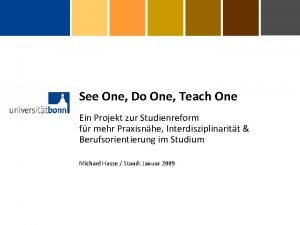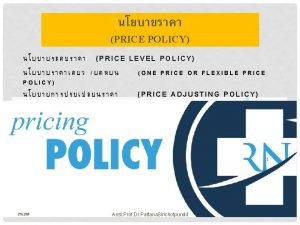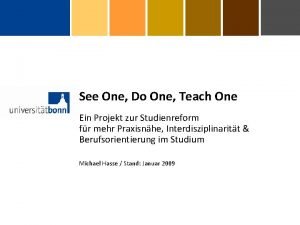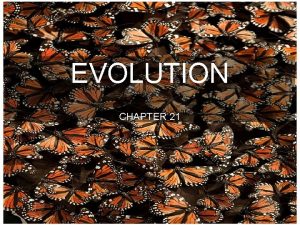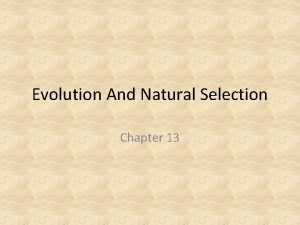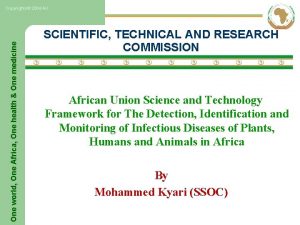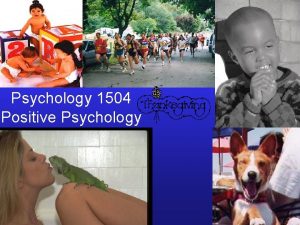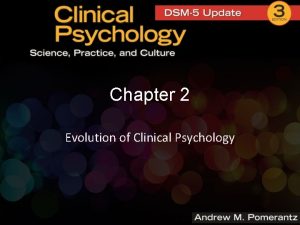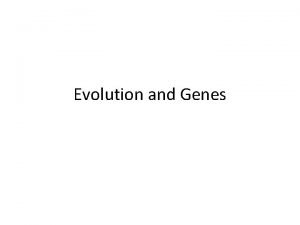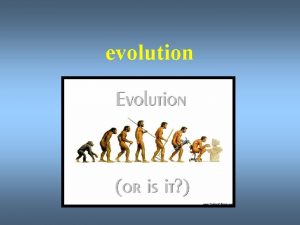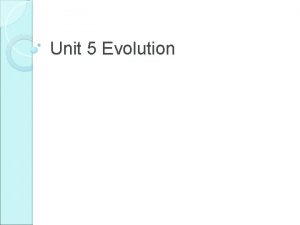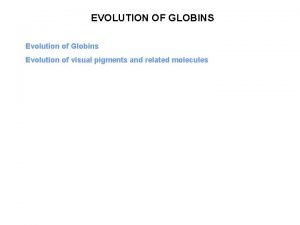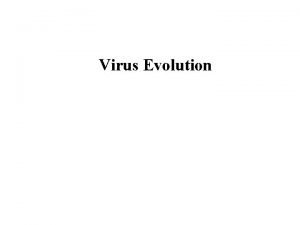Chapter One The Evolution of Psychology Psychology Psychology




















- Slides: 20

Chapter One The Evolution of Psychology

Psychology �Psychology is the study of behavior and mental processes. �Psychology’s intellectual parents were the disciplines of philosophy and physiology. �By the 1870’s , a small number of scholars were exploring “How the mind and body interact”.

The Birth of Psychology �William Wundt was a German professor who introduced psychology as an independent field of study. �In 1879, he opened up the first psychology lab. This was the birth of psychology.

Theoretical Perspectives or “Schools of Thought” in Psychology �Psychoanalysis was the first perspective in psychology. �Unconscious thoughts, memories and desires that influence behavior. � 1900 -present �Sigmund Freud, Carl Jung, and Alfred Adler.

“Schools of Thought” �Behaviorism is a field in psychology that arose in direct opposition to psychoanalytic theory. �Behavioral psychologists believe that psychology should only study observable behavior. �It is also called “Learning” �Ivan Pavlov, John Watson and B. F. Skinner � 1913 -Present

“Schools of Thought” �Humanism or Humanistic Theory is a psychological perspective that humans are unique and rational beings with the potential for personal growth through “self concept”, “self-actualization”, and “free will”. �Carl Rogers, Abraham Maslow � 1950’s-present

“Schools of Thought” �Cognitive Theory is the study of thoughts, mental processes, perception, learning, memory, and beliefs and how people acquire, store, and process information. �Jean Piaget, Noam Chomomsky, and Herman Simon. � 1950’s- present

“Schools of Thought” �Biological Theory or biological psychologists maintain that human and animal behavior can be explained in terms of the biochemical processes that influence how organisms behave. �James Olds, Roger Sperry, David Hubel and Torten Wiesel. � 1950’s-present

“Schools of Thought” �Evolutionary theory of evolutionary psychologists study how behavior is influenced by species adapting to the environment through “survival of the species” and the belief that genetics influences behavior. �“Nature vs. Nurture” �David Buss, Martin Daly, Margo Wilson, Leda Cosimides and John Tooby. � 1980’s-present

Unifying themes in Psychology �Psychology is Empirical. �Psychology is theoretically diverse. �Psychology evolve in a socio historical context. �Behavior is determined by multiple causes. �Behavior is shaped by cultural heritage. �Heredity and environment jointly influence behavior. �People’s experience of the world is “Highly Subjective”.

Areas of Study in Psychology �Developmental Psychology �Educational Psychology �Health Psychology �Physiological Psychology �Experimental Psychology �Cognitive Psychology �Psychometrics �Personality

Chapter Two The Research Enterprise in Psychology

The Scientific Approach to Behavior �Steps in the Scientific Approach (1) Formulate a hypothesis- a tentative statement about the relationship between two variables. Variables are any measurable conditions, events, characteristics or behaviors that are controlled or observed in a study. (2) Design the study and select a research method (3) Collect the data (4) Analyze the data and draw conclusions an (5) Report the findings. �The Advantage of the Scientific Approach is with clarity and precision , there is little error.

Research Methods in Psychology �Research Methods are different approaches to the observation, measurement, manipulation and control of variables in empirical studies. Empirical studies are those done through observation.

Research Methods �Naturalistic Observation is a research method in which researchers observe behavior without intervening. Reactivity can occur in naturalistic observation. �Case Studies are a type of research method in which researchers study an individual subject in-depth. �Correlation studies are a type of research method in which researchers examine the relationship between two variables. The correlation coefficient is a numerical index of the relationship between two variables. Positive and negative correlations occur between variables.

Research Methods �Surveys are research methods in which researchers gather information about a participants behavior, background or attitudes. Researchers gather information through verbal written responses to questions. �The Experimental Research Method is when researchers manipulate a variable under carefully controlled conditions and observes whether any changes occur in the second variable as a result. Research methods identify cause and effect relationships between variables.

The Experimental Research Method �The Independent Variable is a condition or event that a researcher manipulates to see it’s impact on another variable. �The Dependent Variable is the variable affected by the I. V. �In Experimental Research Methods there is an Experimental group. The group that receives special treatment in regard to the I. V. �In Experimental Research Methods there is also a Control group. The control group consists of subjects who do not receive the I. V. They receive a placebo.

The Experimental Research Method �Placebos are empty, fake treatments that provide for expectations of the control and experimental group. Placebo effects are a subjects expectations that lead them to experience some change even though they receive the placebo. �A sample is a collection of subjects selected for observation in a research method study. Sampling bias occurs when a sample is not representative of the population from which it is drawn. A representative sample is an accurate representation of the population.

The Experimental Research Method �Experimental Bias occurs when a researchers expectations or preferences about the outcome of the study influence the results obtained. � The Double-Blind Procedure is a research strategy in which the subjects nor the researchers know who is in the control group or who is in the experimental group. �A Replication study is a study done to see if earlier results are duplicated.

APA Ethical Guidelines in Research �A subjects participation should be voluntary and based on informed consent. �A subject should not be exposed to harmful or dangerous research procedures. �If the study requires some sort of deception the researcher must “debrief” subjects. �Harmful or painful procedures imposed upon animals must be justified in terms of knowledge. �Prior to conducting a study, approval should be obtained from host institutions and research review committees.
 One god one empire one emperor
One god one empire one emperor One one one little puppy run
One one one little puppy run One king one law one faith
One king one law one faith One empire one god one emperor
One empire one god one emperor Ford one plan
Ford one plan See one do one teach one
See one do one teach one See one, do one, teach one
See one, do one, teach one Twelfth night speeches
Twelfth night speeches See one do one teach one
See one do one teach one Asean tourism strategic plan
Asean tourism strategic plan Graphic organizer with the aims of la liga filipina
Graphic organizer with the aims of la liga filipina Hát kết hợp bộ gõ cơ thể
Hát kết hợp bộ gõ cơ thể Lp html
Lp html Bổ thể
Bổ thể Tỉ lệ cơ thể trẻ em
Tỉ lệ cơ thể trẻ em Chó sói
Chó sói Tư thế worms-breton
Tư thế worms-breton Bài hát chúa yêu trần thế alleluia
Bài hát chúa yêu trần thế alleluia Các môn thể thao bắt đầu bằng tiếng chạy
Các môn thể thao bắt đầu bằng tiếng chạy Thế nào là hệ số cao nhất
Thế nào là hệ số cao nhất Các châu lục và đại dương trên thế giới
Các châu lục và đại dương trên thế giới





